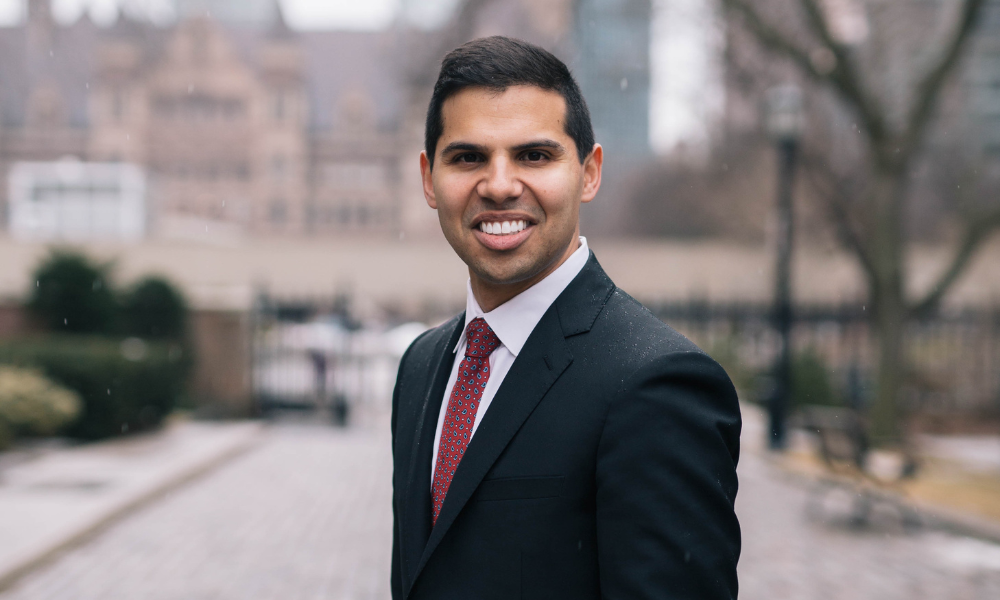
Justice Pazaratz emphasized the children's independent desires not to be vaccinated

A Superior Court judge has rejected a father's motion to have his young children vaccinated despite opposition from the mother and the kids themselves and warned against disregarding certain viewpoints without evidence.
Justice Alex Pazaratz declined to give judicial notice that vaccinating children is in their best interest because it is encouraged by the government. Justice Pazaratz emphasized the children's independent desires not to be vaccinated.
"They both don't want to receive the COVID vaccines, but the father is asking me to ignore how they feel and force them to be vaccinated against their will."
There is a rising intolerance, vilification and dismissive character assassination in family court because it has become socially acceptable to denounce, punish and banish anyone with a different view on the vaccine, Justice Pazaratz wrote.
"When a ten-year-old child says he's afraid he'll be forced to take the vaccine – and he specifically wants the judge to know it – I don't think that's something the court can or should ignore," he wrote. "Children may not have wisdom, but they have Charter rights and undeniable emotions."
Litigation lawyer David Elmaleh says the Superior Court delved into the painful modern-day reality of all things COVID, and the ruling is an open call for litigants and society at large to focus on the evidence and issues of a case than engaging in personal attacks.
Elmaleh says the decision departs from prior cases, and to heal as a community and society, more courageous voices calling out the character assassination of people with different or minority views is critical.
"As the Court noted in this case, 'throughout history, the people who held government to account have always been regarded as heroes – not subversives.' We should all take note and strive to be compassionate and empathetic to those with different perspectives on these critically important issues of the day."
In declining to assume that the appropriate parenting decision should follow public health and government recommendations, Justice Pazaratz wrote that the list of grievous government mistakes and miscalculations is endless and notorious, which is why the courts should be reluctant to take judicial notice that the government is always right.
"It is becoming harder for family court judges to turn enemies into friends when governments are so recklessly turning friends into enemies."
He referred to a list of purported government shortcomings on prior matters, including the Motherisk scandal, the authorization of the experimental drug Thalidomide, Japanese and Chinese internment camps during World War II and the Residential School system.
"What about the residential school system? For decades the government assured us that taking indigenous children away – and being willfully blind to their abuse – was the right thing to do. We're still finding children's bodies," Justice Pazaratz wrote.
In J.N. v. C.G, both parents separated more than seven years ago and have three children together. The oldest lived mainly with his father and chose to be vaccinated against COVID-19 last fall, and both parents supported his decision.
In two interviews with a social worker, the younger children, a 12-year-old girl and a 10-year-old boy, living primarily with their mother, explained why they did not want to be vaccinated. The youngest also expressed fears that his father would force him to vaccinate.
She submitted scientific papers and a fact-sheet issued by Pfizer, stressing that she is not against vaccines overall and would be open to having the younger two children vaccinated later if safety concerns can be better addressed.
The father submitted reports by the government, the Canadian Paediatric Society and numerous downloads from the mother's social media accounts alleging she promoted conspiracy theories and was a part of the anti-vaccine-mandate People’s Party of Canada.
Justice Pazaratz chastised the father's litigation approach saying he focused extensively on labelling and discrediting the mother in a dismissive attempt to argue that her views were not worthy of consideration when her evidence focused entirely on the medical and scientific issues.
"Have we reached the stage where parental rights are going to be decided based on what political party you belong to?" he asked.
He noted the difficulty in faulting a parent for being worried about an ominous list of potentially severe side-effects, especially when evidence demonstrated that she did not impose her views on her children and was genuinely concerned about their health and safety. "She is not a bad parent – and no one is a bad citizen – simply by asking questions of the government," he wrote.
"When society demonizes and punishes anyone who disagrees or even dares to ask really important questions, the resulting polarization, disrespect, and simmering anger can have devastating consequences for the mothers, fathers and children."
Justice Pazaratz wrote that health directives have frequently changed during the pandemic as new knowledge emerged. He noted that in prior cases where judicial notices established the vaccine to be in children's best interests, their views on the immunization were unascertainable or less relevant because of a lack of maturity. (McDonald v. Oates 2022 ONSC 394, Saint-Phard v. Saint-Phard 2021 ONSC 6910, Rouse v. Howard 2022 ONCJ 23)
In circumstances where the court overrode children's preferences, the parent seeking vaccination presented more practical information to the children and made compelling arguments. On the other hand, the materials submitted by the objecting parent were grossly deficient, unreliable, sometimes dubious and lacked a credible counterpoint to government recommendations, Justice Pazaratz wrote.
"Anyone reading even some of the articles presented by the mother would likely conclude that these are complicated and evolving issues, and there can be no simplistic presumption that one side is right and that the other side is comprised of a bunch of crackpots. That's why the court should require evidence rather than conclusory statements."